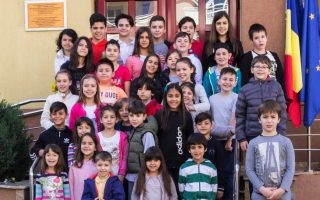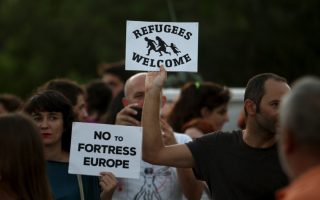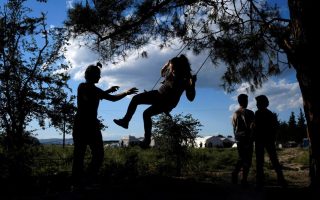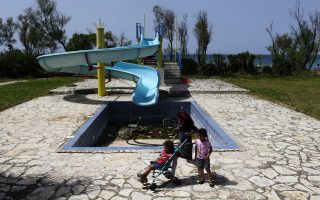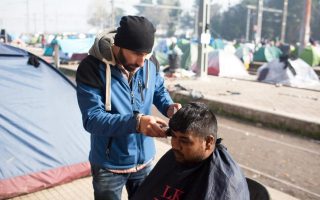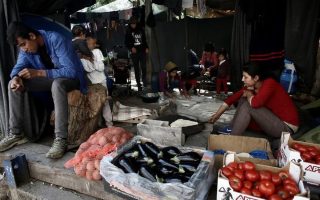In their final hours in Greece, refugees are briefed on their new home

As the airplane touched down in Ljubljana Joze Puncik Airport, Hiba closed her eyes and held her breath, just for a few seconds. She did not feel fear but relief. They were finally safe. Just days earlier, the 30-year-old woman from Syria could barely find Slovenia on the map.
“I hope that you will love my country as much as I do,” an official from the Slovenian Embassy in Greece had earlier told a group of about 20 refugees, mostly from Syria and Iraq, including Hiba. “After all, it’s the only country which contains the word ‘love’ in its name (S-love-nia),” she added.
The meeting took place at the headquarters of the Athens branch of the International Organization for Migration (IOM) in Alimos, on the city’s southern coast. The group of refugees were invited to attend a cultural orientation seminar about Slovenia, soon to be their new home.
As stipulated by the rules of the relocation program from Greece to other European Union states, which is carried out with help from IOM, the refugees did not get to pick their destination. EU governments participating in the relocation program inform the Greek Asylum Service how many asylum seekers that they are willing to take in. Greek authorities respond by sending a list of names of the beneficiaries. IOM Greece then takes care of their safe transfer. Before the journey, IOM officials provide information about the procedure.
During the briefing on Slovenia, Hiba and the rest of the group were evidently anxious and impatient. They had to be at Athens International Airport at 3 a.m. the next day. Sitting in the IOM office in Alimos, they had already completed a long and exhausting journey. The final act would play out in just a few hours.
The group was not uniform. Among the beneficiaries were people, like Hiba, who once lived a relatively comfortable life in Syria (Hiba’s husband used to run two pharmacy stores), some young couples, and some older people who had never traveled on a plane before. IOM’s cultural mediator, Michalis Kenteroglou, tried to cover all possible aspects of the entire procedure.
“Each person is allowed to carry one piece of luggage weighing no more than 23 kilos and one standard cabin bag no more than 7 kilos,” Kenteroglou said with the help of an IOM interpreter. “You cannot carry any sharp items or liquid containers larger than 100 ml. Your shampoo, for instance, must be placed in checked baggage,” he said. “If you are a mother, you can carry your baby’s milk,” he said.
Given that the people came from different cultural backgrounds, the IOM officials took care to stress that body checks at the airport are made by officers of the same sex as the passenger. “Once you are through, it is a good opportunity to visit the bathroom or drink some water,” Kenteroglou said. “Also, it is good to stay together as a group. And never make jokes about bombs and so on. Leave your humor outside the airport and the aircraft,” he said.
A young man raised his hand. “How will I get to the airport?” IOM had hired a coach that would pick up the passengers from four designated spots, but this man was staying far from the route. “I will let you know how you can get there and what transport you need to use to be there on time,” Kenteroglou said. The response did not quite ease the young man’s concern, which was in a way striking: He who had braved the perilous journey from Iraq was now worried about getting from Piraeus to the airport. (He eventually made it on time.)
Following the pre-embarkation briefing preparing them for the flight, the refugees were given information about Slovenia. A slideshow was projected on the wall with beautiful images of Slovenia’s mountains, lakes and towns.
As they watched, smiles appeared on their faces. Soon, they knew that Slovenia is a parliamentary democracy with a population of approximately 2 million people. The official language is Slovenian while Christianity is the largest religion.
“However, do not worry. Slovenia guarantees the right to freedom of religion. You are free to practice your faith, and there is a Muslim community,” Kenteroglou said.
He told them about the weather: Winters in Slovenia are cold – temperatures drop to -5C (23F) – while summers are warm. Until the asylum process is complete, the newcomers will stay at designated reception centers, they will enjoy free access to healthcare and food as well as psychological and legal advice. They will also be entitled to housing benefit for 36 months.
“I wish everyone the best of luck,” he said.
